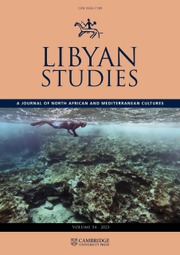No CrossRef data available.
Article contents
A Survey of Islamifying Trends in Libyan Law since 1969
Published online by Cambridge University Press: 03 March 2015
Extract
The commitment to reinstatement of the sharī‘a, or traditional law of Islam, has been a striking feature of the programme of Libya's revolutionary government. Before 1969, legal development in Libya had conformed to the universally observable trend in Islamic societies of introducing secular laws on Western lines at the expense of the sharī‘a. True, the sharī‘a had not been superseded in Libya to as great an extent as in some countries, but its influence was largely restricted to matters of personal status and the regulation of certain traditional Islamic institutions. Civil and commercial codes on the French model had been introduced, and the Libyan Penal Code was inspired by the French and Italian versions. In 1971 the Revolutionary Command Council set up a commission to revise Libyan law in accordance with the sharī‘a, a task given renewed emphasis in 1975, when a law was passed reorganizing the commission. Since 1971 a number of laws modelled on the sharī‘a have been promulgated and, presumably, more are yet to come.
An understanding of this remarkable development has been slow in coming. Information on Libyan law is regrettably difficult to obtain outside Libya, and many potentially illuminating sources remain unavailable to Western students. The impression one gleans from the incomplete materials presently available is that broad guidelines for the work of the commission revising the laws have been set. On a given legal issue the most lenient solution is to be selected from among the doctrines of the schools of Islamic jurisprudence, with consideration being given to the public welfare (maṣlaḥa) and Libya's traditional adherence to the Mālikī doctrine. However, one would like to know much more about the rationale underlying the specific enactments. Nonetheless, since this important trend has now been under way for several years, a tentative assessment, even if based on an inadequate range of sources, is long overdue.
- Type
- Research Article
- Information
- Copyright
- Copyright © Society for Libyan Studies 1976
References
Footnotes
1 Also in 1971 a commission was entrusted with the assignment of working out a new Code of Personal Status on a sharī‘a basis. This project has yet to culminate in the promulgation of a law.
2 A law regulating interest charges on loans from commercial institutions has apparently been prepared, but so far no such law has been enacted. It has been suggested that this projected law would have prohibited interest on bank loans as falling within the sharī‘a prohibition of usury.
3 The new law on extra-marital relations eliminates the distinction which the traditional law drew between the muḥsin offender, that is, one who is or at one time has been married, and offenders who have never been married. The new law includes only the penalty which was traditionally applied to the latter class.




